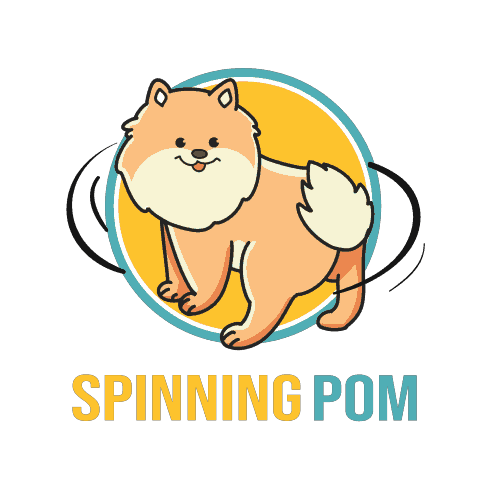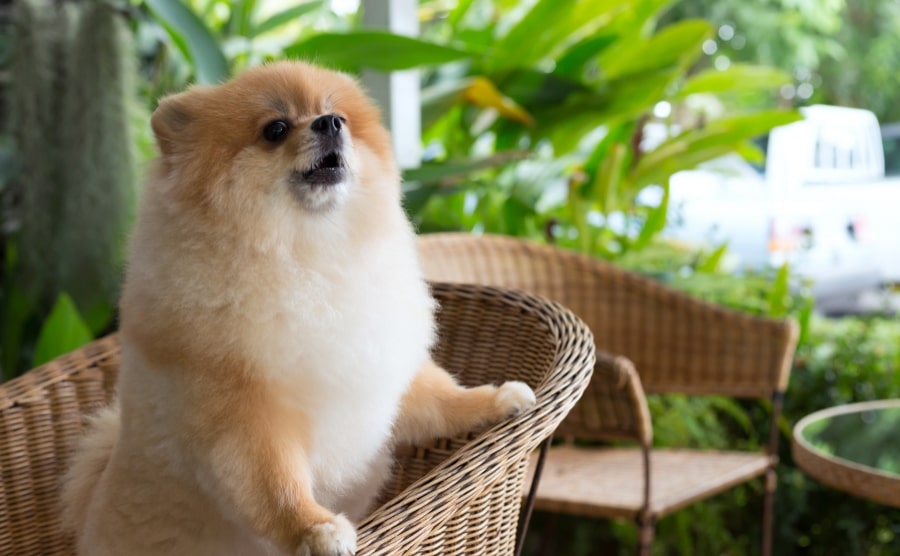Are you having trouble sleeping during the night because of your Pomeranian puppy’s intensive barking? Or your Pomeranian whines and howls when you leave them alone? While Pomeranians are adorable and cute, they’re still tiny dogs who sometimes love to express their feelings by barking.
So, how can you train a Pomeranian puppy not to bark? To teach your Pomeranian puppy to be quiet, you have to establish that being quiet is what gets your Pomeranian a reward. In addition to this, you shouldn’t encourage the behavior by paying extra attention to your Pomeranian when they bark.
Since it sounds easier said than done, I’ve prepared this 10-step guide on how to train your Pomeranian to stop barking. So keep on reading.
How to Teach a Pomeranian Puppy Not to Bark
In general, Pomeranians aren’t one of those dog breeds that love to bark. However, some Pomeranians can be very vocal when they want something or when you leave them alone during the day.
Since it’s not pleasant to deal with angry neighbors, teaching your Pomeranian to be quiet has its advantages. But it won’t happen overnight.
1. Be the Pack Leader
Your first step in training your Pomeranian puppy not to bark is to establish yourself as the leader of the pack.
If your Pomeranian puppy doesn’t see you as the pack leader, they’re going to assume the role of the alpha and won’t obey your commands. They will feel compelled to watch out for potential threats and might bark more than usual to “protect” you.
So, always reinforce your rules and never allow your Pomeranian to be bossy or do whatever they want. Be the first to enter or exit the house, and never allow your Pom to pull their leash during walks.
2. Understand Why Pomeranian Puppies Bark
While some dogs love the sound of their voice, most Pomeranian bark for a reason. Once you figure out what’s making your Pomeranian puppy bark, it will be easy to correct the behavior.
Usually, Pomeranian puppies bark to:
- Attract attention
- Inform you about potential threats
- Tell you they’re in pain or distress
- Relieve boredom
- Warn you to stay away from them
3. Remove the Trigger
Often Pomeranian puppies get some sort of “reward” when they bark, and that’s why they continue to do it.
For example, barking at people or animals outside is rewarding because your Pom thinks they’re protecting their home and territory by scaring intruders. Barking often brings extra attention to you, which is also a reward.
So, you have to identify your Pom’s triggers and remove them as much as possible. Block the view from the windows or move your Pomeranian puppy to another room when they start barking at passersby.
During walks, choose a route with few distractions. Whenever your Pomeranian puppy starts barking as crazy, place a barrier between your Pom and whatever is triggering their barking.
4. Ignore the Barking
Imagine the following situation. Your Pomeranian puppy barks at night, and you get up from bed to check on them. The next thing the puppy does it again. Sound familiar?
While owners often feel the urge to comfort their Pomeranian when they’re barking, it’s counterproductive.
You’re teaching your Pomeranian puppy that as long as they’re making noise, you’ll come running. Your attention is a reward for the puppy, so your Pom is more likely to repeat this behavior.
Specialists recommend that you ignore your barking Pomeranian puppy. Don’t look at them, touch them, or talk to them. When the puppy finally calms down, you can reward them with a treat.
If your puppy tends to bark at night, make sure that they have everything they need in their playpen and that you take them to do their business before bed. Then you should let your Pomeranian puppy bark as long as they want.
It might sound cruel, but if you give in, your puppy will bark twice as long the next time.
5. Don’t Yell
Sometimes when your Pomeranian puppy has been barking for hours, you start yelling at them out of frustration. That’s a huge mistake.
Puppies often think about yelling as another form of barking. So, in their mind, you’re joining the fun, and they’ll bark twice as hard. That’s why it’s so important to ignore the barking as much as possible.
6. Teach Your Pomeranian Puppy the “Quiet” Command
Do you know it’s possible to teach your Pomeranian puppy to be quiet on command? It’s easy but it involves teaching your puppy to bark on command. So, in the first few weeks, you might hear more barking than usual.
So, here’s how to teach the quiet command:
- Use the doorbell or another barking trigger.
- The moment your Pom starts barking, say “speak” and give them a treat.
- Keep practicing until your Pomeranian masters the command.
- Tell your Pomeranian puppy to bark, then say, “Be quiet,” and place a treat beneath your Pomeranian’s nose.
- Wait for your Pom to stop barking and reward.
- Keep practicing until your Pomeranian puppy stops barking when they hear “Be quiet.”
7. Interrupt, Reward, and Redirect
Whenever your Pomeranian puppy starts howling, interrupt them as soon as possible. You can clap your hands, call them in a firm voice, or use a pet corrector, which emits a hiss of air.
Once your Pomeranian stops barking, you reward them immediately to reinforce the behavior. So, you should keep high-value treats in your pockets.
Then you should redirect their attention to something else. For example, you might engage in some obedience training, go for a walk, or play a game. Continue to give praises and rewards as long as your Pom is quiet.
You might also ask your Pomeranian puppy to do something they can’t do if they’re barking. For example, tell them to roll over or toss them a ball and say, “Fetch.”
8. Provide Plenty of Exercises and Mental Stimulations
As I already mentioned, your Pomeranian puppy might bark out of boredom. Imagine being stuck in the house with nothing to do for days. Terrible, right?
So, you have to ensure that your Pomeranian puppy has enough opportunities to burn off their energy and that they have enough toys to keep them busy and entertained.
9. Deal with Separation Anxiety
Since Pomeranians are companion dogs, they are prone to separation anxiety. This condition develops when your Pomeranian has such a close bond with you that they can’t stand it when you leave them alone.
Most often, owners mistake separation anxiety for a behavior problem because Pomeranians act destructively and make a mess in the house. However, your Pom is in actual distress.
Usually, dogs with separation anxiety start to whine and howl the moment you leave the house or a few minutes before you leave. When you come home, they act as if you’ve been gone forever.
To combat separation anxiety, you have to teach your Pomeranian that your comings and goings aren’t a big deal. Exhausting your puppy and leaving a toy to keep them company also help.
10. Involve the Whole Family and Be Consistent
One of the worst things you can do when you’re training your Pomeranian puppy not to bark is being inconsistent. For example, you can’t alternate between comforting your puppy when they’re barking and “punishing” them. Set your rules and stick to them.
You should involve the whole family in the training process. In this way, all your family members are going to react to your Pomeranian puppy in the same manner.
Closing Thoughts
When you’re training your Pomeranian puppy not to bark, you have to remember that barking is how dogs communicate. You can’t expect your puppy to be quiet all day long, but you have to teach them to stop when you say so. You can do it as long as you’re patient and consistent.
What do you think about this 10-step guide on how to train a Pomeranian puppy not to bark? How did you deal with your Pomeranian barking? Tell us in the comments.





